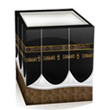The Ruling on a Menstruating Woman Reading Tafseer
- Details
- Category: Sheikh Bin Baz
- Published on Thursday, 07 November 2013 10:43
- Hits: 916
The Ruling on a Menstruating Woman Reading Tafseer
Question:
I read books of Tafseer of the Qur'an when I am not in a state of purity... such as during my monthly period, is there any objection to this, and am I committing any sin by doing so? Please deliver a verdict, and may Allah reward you.
Answer:
There is no objection to the menstruating woman or the one who has postnatal bleeding reading books of Tafseer nor reciting the Qur'an, without touching the Book according to the most correct of the two opinions held by the scholars.
As for the one who is Junub, he may not recite the Qur'an at all, until he makes Ghusl, but he may read the books of Tafseer, Hadith and the like, without reciting the Verses they contain, as it has been authentically reported from the Prophet salallaahu 'alaihi wasallam that nothing prevented him from reciting the Qur'an except Janabah. [Abu Dawud no.229, Ibn Majah no.594 & Ahmad 1:84, 124].
And in another version narrated by Imam Ahmad, with a good chain of narrators, he said:
ÝóÃóãøóÇ ÇáúÌõäõÈõ ÝóáÇó æóáÇó ÂíóÉð
"As for the one who is Junub; no, not even an ayah." [Ahmad 1:110]
Shaykh `Abdul-`Azeez Bin Baz
Fatawa Islamiyah, vol. 1, p112-113, DARUSSALAM.





















